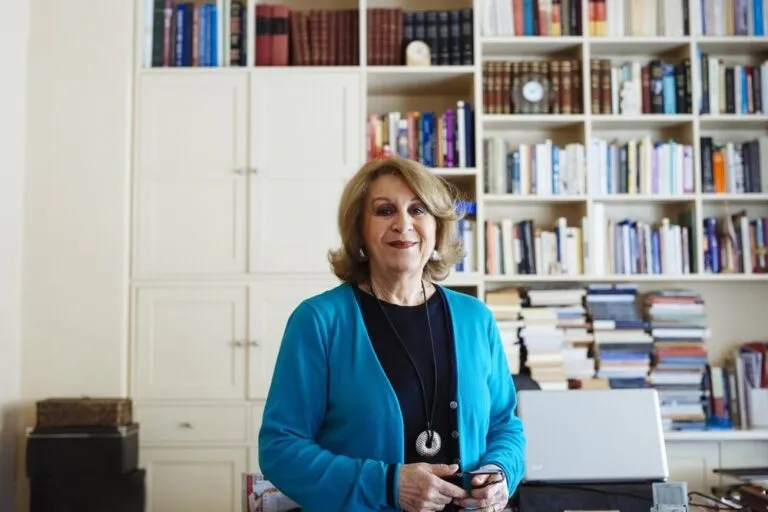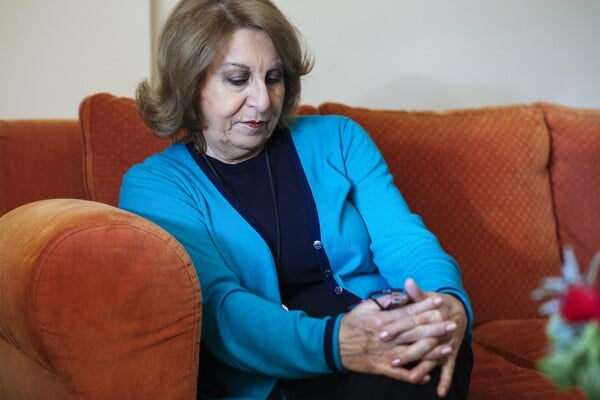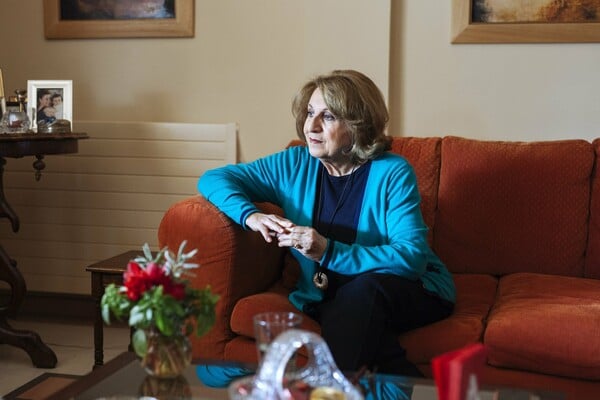Anna Karamano: “Mediocrity in a famous man is forgiven, we have to be perfect in everything”
One of the most combative Greek feminists speaks to LIFO.gr about the release of her new book.

The real “revelation” came when I had the opportunity to study in California thanks to a scholarship between ’65-’66. Now imagine how I felt, a country girl from a conservative family, experiencing all this atmosphere of questioning, liberation, and rights that prevailed there at the time. Photo: Paris Tavitian / LIFO.
Former member of the European Parliament (1997-2004) and the presidency of the Group of European Socialists, president of the Women’s Rights Committee, founding member and vice president of the Political Women’s Association, the friendly, approachable, petite but courageous and dynamic woman across from me was one of the most combative feminist politicians in Greece – she did not hesitate to clash even with the ecclesiastical establishment on issues such as the “monastic ban” on women in Mount Athos, the misogynistic excerpts from sacred texts, and the ordination of women. Although she no longer engages actively in politics, she still has a passion for feminism and recently proposed a woman for President of the Republic. Her latest work The Europe and Women’s Rights (Papazisis Publications) examines and compares the European impact on gender equality and the fight for women’s rights in Greece and Turkey over the last two centuries, reflecting on all the major moments and forms of the women’s movement in both countries, offering a wealth of interesting data and testimonies. We discussed the Greek (mainly) experience, the present and future of the women’s movement, and her own feminist experiences. Having made the motto of pioneering Greek feminist Kallirhoe Parren, “to succeed where men have failed,” her critique highlights the discrimination, abusive language, and violence against women, emphasizing that gender equality is a prerequisite for modernization, development, prosperity, and a reduction of both competition and violent conflicts between nations and peoples.
—When did you start having feminist “concerns”?
Since I was young, I was troubled by discrimination, the different standards – until I was twelve, we were together with the boys, then we were separated, us in the girls’ school, oriented primarily towards becoming good mothers and wives, while the boys were in the boys’ school with open horizons. I didn’t like this at all, I wanted to change it. But the real “revelation” happened when I, thanks to a scholarship, went to study in California between ’65-’66. Imagine how I felt, a small-town girl from a conservative family background, living close to all the climate of questioning, liberation, and the demand for rights that prevailed there. I observed how much freer women were at college, at parties, at clubs, in everyday life, and how far they had progressed on issues of equality and self-actualization. Here, we didn’t even dare to look boys in the eyes, there they went everywhere hand in hand! After May ’68, the women’s movement “flared up” in Europe as well. However, when I returned to Greece, I was harshly confronted with a much more outdated reality. Furthermore, any progress was delayed even more by the arrival of the junta.
As public figures, we are certainly judged much more harshly. Discrimination, sexist and derogatory language, unfair competition… Our value, abilities, and even our femininity are constantly questioned. Mediocrity in a famous man is forgiven, but we must be perfect in everything! Some even rush to adopt male standards, thus serving the patriarchy better than the men themselves.
—You did, however, get married for the first time at a young age.
Yes, I was pressured, you see – my mother wanted me to get married at 19! It was a huge compromise for someone like me, who had always gone against the current. In the end, I managed to have two successful marriages, followed by two equally successful divorces! I couldn’t stand being “under,” I wanted equality. Fortunately, my daughter and especially my three granddaughters – female dominance even in the family, as you can see – are growing up in a world much more open to their rights. My granddaughters, in particular, it seems from now that they will never even consider the role of domestic help, which was taken for granted for our grandmothers; they know what they want and what they ask for.
Workplace discrimination was huge in the past…
You can’t imagine. I experienced it firsthand when I was hired by OTE. Female employees at that time, only 18% of the total, were exclusively assigned as secretaries, telephone operators, and cleaners, regardless of their qualifications. They were obviously paid less and were indirectly forced to retire after 15 years. The Telephone Operators’ Union itself defended these discriminations by promoting the “female specificity.” I saw it as my duty as a feminist and unionist to contribute to overturning this status quo, which happened with Greece’s entry into the EU (then EEC), initiating the equalization of wages and opportunities. Soon after, Andreas Papandreou’s PASOK came to power. The 1980s saw a real revolution in issues of gender equality and combating discrimination, not without reactions ranging from open hostility to irony and devaluation. Family law changed, which until then recognized the man as the “head” of the family, civil marriage was established, adultery was decriminalized, schools were merged, and wages started to be equalized… However, Andreas himself and the male ministers didn’t show much interest in women’s issues. It was primarily the feminists within and outside PASOK who fought for equality. Margarita Papandreou’s contribution to this effort was especially significant. A popular slogan at that time was “I am not my father’s, I am not my husband’s, I am myself.” Agricultural women were also granted pensions for the first time, though I don’t see them alongside their husbands at the tractor protests, and the reason is certainly not that they have everything sorted! Back then, we also had a certain purity, a selflessness. We weren’t interested in public offices – I was in my fifties (and divorced!) when I expressed interest in the European Parliament, after having worked in the women’s networks of the Commission on expanding professional opportunities.
—There were accusations of “partisanship,” of “governmental” feminism.
Yes, there was a sort of “incorporation,” if you like, but no one prevented women’s organizations from existing and acting. Simply, due to social conditions, the women’s movement in Greece was never as massive as it was in the U.S. or Western Europe – theoretically, women had already achieved equality in the USSR, China, and countries of the former Eastern bloc, which in reality were also male-dominated. Then, the changes in the educational system that were promoted “from within” helped a lot – today, women outnumber men in universities, master’s programs, and PhDs, and have “flooded” the humanities.

—What do you consider the primary issue for women today?
The increase in violence, especially domestic violence, something that was tragically confirmed by the two recent horrific murders of women who wanted to divorce their husbands. Even the home is not a safe space for women. It’s no coincidence that today 9 out of 10 divorces are initiated by women – the economic crisis has also contributed to the intensification and antagonism between the sexes, while it has hit us harder since unemployment among young women reaches 60%.
—Judging by how the media and political opponents still treat female politicians, a woman needs extraordinary strength to be exposed to public life.
Clearly, public figures of the female gender are judged much more harshly than their male counterparts. Discrimination, sexist and derogatory language, unfair competition… Our value, abilities, and even our femininity are constantly questioned. Mediocrity in a famous man is forgiven, but we have to be perfect in everything! Some even rush to adopt male role models, thus serving patriarchy better than men do. To change this, we need implemented equality policies and more female representation in parliament, public administration, decision-making centers, and why not, in the presidency of the Republic: in the last election, some of us had proposed Marietta Yannakou, who, although conservative, possesses many skills and a broad perspective, and is also fighting bravely with her disability. However, they preferred Paki.
—Your statements and initiatives for the removal of the female “taboo” on Mount Athos had created quite a stir some years ago.
There was quite an uproar, but unfortunately, no follow-up was given. I was the president of the Women’s Rights and Gender Equality Committee when we submitted the relevant resolution. Then came the condemnatory decisions of the European Parliament (2001 and 2003). I even discussed the issue with the Patriarch when I was at the Phanar, who invoked tradition. But we didn’t find many willing allies even in the progressive world…
—You had also spoken positively about the priesthood of women, I remember.
Of course, because it may represent an anatomical difference due to exclusion from any space or office. In other places, the Church has liberalized considerably, and women are ordained. There are enlightened clergy here too, but they are few. The Orthodox Church insists on operating strictly patriarchally, and therefore undemocratically. For example, think about how unacceptable it is for girls being baptized to be blessed outside the sanctuary, while boys are blessed inside… This is due to the so-called Greek uniqueness!
— How do you define this uniqueness?
I mainly locate it in the 400 years of Ottoman rule. To change the culture of a people takes at least 2-3 centuries, and we have not even had an independent state for that long. We are still divided between the West and the East, with the scale tipping more toward the latter. As I mention in the book, Turkey under Kemal made impressive strides in gender equality, being even more advanced than Western Europe: It abolished the veil, gave the right to education, voting, etc. Similarly, in Greece, some steps were taken during Venizelos’ time.
A “milestone” for women’s rights in Europe, I read, was the Rome Treaty in 1957.
Yes, because it established equal labor rights and equal pay for men and women – though it wasn’t done for reasons of sensitivity, but economic competition. And of course, most countries were very slow to incorporate these directives.
How do “veteran” feminists view Femen and the newer gender deconstruction theories proposed by Judith Butler?
I have always been open to new ideas, and Butler says many interesting things, but I believe that genders are distinct. Of course, we all have both male and female hormones, so one gender naturally possesses traits of the other. Certainly, there is no such thing as a perfect woman or perfect man. However, I think the issue isn’t to erase biological sexes but to challenge the system of male privileges and patriarchy, because that is where the discrimination stems from. As for Femen, they are trying to grab media attention with “extreme” methods, which I don’t always agree with. However, they are a dynamic minority trying to raise awareness among the majority, much like the first feminists.

A lot of talk is also being made about sexism in language. On the other hand, the use of double endings, even the @ symbol, is being proposed as a more “neutral” option.
Certainly, there is sexism in everyday language, and this is something that should concern progressive linguists. It is understood that the feminine form should be used where it exists, for example, saying ambassador, female director, female member of parliament, or parliamentarian, rather than the corresponding masculine terms, which are typically used – not without reason! – especially in positions of power. I also agree with the double ending, as language is a living organism that constantly evolves, but I find the use of @ to be excessive.
—Opponent or ally, the man?
Neither, we are simply trying to coexist! A man can certainly be an ally under certain conditions. After all, he too is victimized, constantly forced to justify his supposed superiority. He is “forbidden” from expressing his emotions, showing vulnerability, or shedding tears… What men need is a movement to free them from the stereotypes of their gender. Personally, I love men who aren’t ashamed to cry!
—The protest with the chicken at Maximos’ office recently was also described as sexist, even though it was carried out by a woman.
Of course, it was, and I’m glad you give me the opportunity to say so! I don’t know what kind of activism that woman thought she was doing. I disagree with the government’s policies too, but I can’t respect anyone who perpetuates clichés and prejudices.
—With the refugee issue at the forefront of current events, how sensitized have Greek feminists been to the situation of refugee and immigrant women? I’ve only seen such initiatives in Exarchia.
No, there is interest and work being done by many humanitarian and other organizations, although this happens away from the spotlight. Of course, a comprehensive approach to the refugee issue is needed – you save one life, and the next day you hear in the news that about twenty more were lost… As long as there are wars and poverty, refugees and migrants will continue to arrive in a Europe that remains a mythical Promised Land in their eyes, even though today’s Europe is not exactly the one we once envisioned.
—What do you think about the New Year’s Eve group sexual harassment in Germany?
Certainly, it was unacceptable, as it undermines any culture of gender equality, dignity, and mutual respect. No, I don’t think it was something organized—it’s related to mass psychology, deprivations, and sexual and cultural repressions. Similar scenes had occurred earlier in Syntagma Square and during the “Arab Spring” in Cairo. However, sexual harassment is not a recent phenomenon, nor is it “imported.” Every woman has experienced it, not just once but many times in her life—when it no longer happens, you realize that you’ve grown up!
—How do you judge Muslim women and some Western activists who consider the headscarf a right?
I obviously disagree. The hijab – which predates Islam – is a symbol of discrimination, not self-determination, which is why I have always supported its ban in public spaces. The uncovered female head was also condemned by Christianity, by Paul himself, but in the West we managed to free ourselves from such unfree bonds, we cannot go back to them. Every tradition is respected to the extent that it does not violate fundamental human rights and personal dignity. We cannot flatten all cultures in the name of accepting difference. Imagine that recently a German judge did not validate the divorce of a Muslim woman who requested it because her husband was beating her, reasoning that this is not condemnable in Islam. Is that possible? Can we then accept, for example, child marriages or female genital mutilation because they are supposedly “customs”? Yet, 3,000 girls undergo this each year in England, not in Africa. Of course, there are such cases in Greece too, but they are not known. I should also remind you that the Sharia still applies in the Muslim minority of Thrace, and it is unacceptable that no government has dared to abolish it so far.